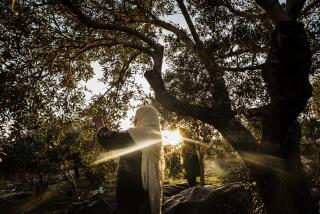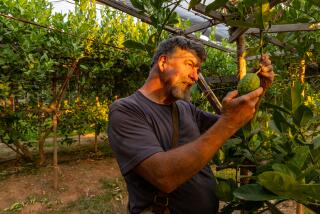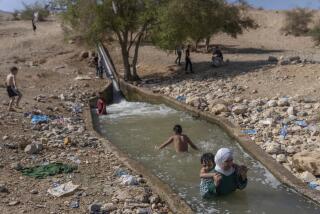Gritty Israelis Find a Business They Can Get Their Teeth Into: Crocodile-Farming
- Share via
KIBBUTZ GAN SHMUEL, Israel — A diverse group of Israelis with little in common except leathery persistence and a sharp nose for opportunity is hoping to take a giant bite out of an obscure but growing $500-million worldwide market.
You could call them farmers, but while their Zionist predecessors drained the swamps to raise citrus and vegetables, these modern Israelis create new marshes in order to “grow” their crop--crocodiles whose skins will later be turned into shoes, handbags and wallets.
“It’s a new thing in Israel,” said Emmanuel Solnik, manager of a pioneering, five-acre crocodile farm here at one of the country’s oldest kibbutzim. And he concedes that the last two years since Gan Shmuel bought its first 220 African crocodiles have been mostly a time of learning.
Somebody, for example, thought it would make the farm more pastoral to have a few ducks around.
“They lasted only a matter of seconds,” Solnik recalled.
The oval-shaped area where Gan Shmuel keeps its adult crocodiles is surrounded by two fences, both topped with barbed wire. Doberman pinscher dogs patrol between the fences. The inner, stone wall is enough to keep the crocodiles from escaping, said Herma Slegman, Solnik’s pretty Dutch assistant. The outer fence and the dogs are to keep curious human visitors from trying to get in.
So far, the ducks and about 40 crocodiles which died during the move from Africa to Israel are the only casualties of the new venture, although Solnik admitted that when he met breeders during an indoctrination visit to a Zimbabwean crocodile farm “the first thing I looked at was to see if they had all their fingers.”
But aside from a few teeth, Solnik contended, raising crocodiles is essentially no different from “raising chickens or any other animal.” And it promises to be a lot more profitable.
The combination of international agreements banning or severely restricting crocodile and alligator hunting and the strong demand from increasingly affluent American and European consumers for goods made from such skins has pushed prices up sharply.
(Alligators are members of the crocodile family indigenous to the United States and China.)
The best skins sell for as much as $200 apiece, and a good quality alligator bag may cost $2,000. Crocodile meat, which is considered a delicacy--”It’s like shrimp,” said Solnik--fetches $6 or more per pound.
Profit is important in kibbutz communities such as this one, where socialist ideals remain so strong that children are raised from the age of six months in communal childrens’ homes. It is as important here as it is in the corridors of Clal (Israel) Ltd., the $1-billion investment company that helped Gan Shmuel get its farm started.
One of Clal’s 200 subsidiaries is Clal Crocodile Farms Ltd. (CCF), which is headed by the “father” of the nascent Israeli crocodile industry, Shlomi Ranot.
In a previous job, CCF general manager Ranot built an alligator park as a tourist attraction at the Hammat Gader resort near the southern tip of the Sea of Galilee.
Pilot Project
Ranot, however, saw brighter prospects and joined Clal to establish a pilot crocodile farming project in Mombasa, Kenya. Clal has since started a second farm in Bophuthatswana, one of the so-called “black homelands” in South Africa, and concluded an agreement by which it manages an alligator farm in Orlando, Fla. Ranot said in a telephone interview that he is currently discussing additional farms with potential investors from California, Jamaica, Brazil and elsewhere.
Clal is also a junior partner in the Gan Shmuel project, which Ranot says he hopes will be the first of as many as 10 crocodile farms in Israel serving as the basis of a future, integrated industry.
Clal supplied Gan Shmuel with the herd of adult African crocodiles, which are to serve as the foundation of the kibbutz breeding business, and it will act as sales agent when the first offspring are ready for market, Ranot said.
In the next phase of its crocodile venture, Ranot added, Clal plans to open a centralized plant for tanning crocodile skins from all its farms. And after that, the plan is to begin manufacturing crocodile skin goods.
“Our main limitation now is time,” he said.
First Eggs Infertile
The first eggs laid in Israel by Gan Shmuel’s breeding herd were not fertile, apparently because of the trauma of the move north from Africa. So the first “native” kibbutz crocodiles are not expected to appear for several more months.
“Until now we really don’t have the answer to the main question,” said Solnik. “Some people say these animals won’t reproduce here.”
Other kibbutzim are waiting “to see what will happen here” before starting their own crocodile herds, said Solnik. So this year’s hatching season is critical to the venture.
Meanwhile, Solnik and Slegman are enjoying learning about their charges.
“It’s very interesting to watch them,” said Slegman. “They have some games between themselves--they repeat them, so it means something.”
A Respectful Distance
Both, however, advised watching from a respectful distance. These African crocodiles can be man-eaters, they warned. The creatures grow up to 18 feet in length, or one-third again as large as the typical American alligator.
Somebody brought around a recent photograph of a crocodile whose stomach had been cut open. Inside, said Solnik, one could see the remains of the bottom half of a man.
Slegman smiled at a reporter who had been inside the crocodile pen taking pictures.
“He was a photographer,” she said of the victim.
More to Read
Sign up for Essential California
The most important California stories and recommendations in your inbox every morning.
You may occasionally receive promotional content from the Los Angeles Times.











